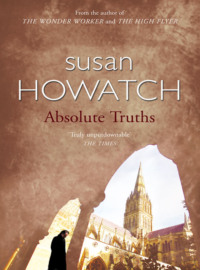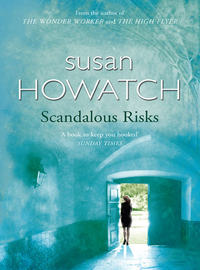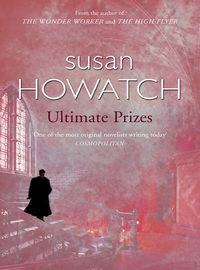
Полная версия
Glamorous Powers
‘Quite. But I really must resist the temptation to be diverted,’ said Francis, ‘by an enthralling discussion of determinism and free will. Now if we may return to your visions –’ Francis sighed as if he found the word a heavy cross to bear ‘– do they always relate to the future?’
‘Not necessarily. They may represent the present or past seen from another angle. Or if they do relate to the future, the past may be present as well. It’s as if I’m moving in a dimension of reality which exists beyond time as we understand it.’
‘How do you classify this present vision as far as time’s concerned?’
‘I think I’ve seen the future. There was nothing of the past or present in it at all.’
‘And maybe nothing of the future either. But before we get bogged down in scepticism,’ said Francis, allowing me no chance to comment, ‘give me an example of a vision which was rather less enigmatic than this one. I feel I need some yardstick of comparison.’
After a pause I said: ‘In my last vision – not this present one, but a vision I had in 1937 – I found myself back in the prison where I worked before I entered the Order. I was walking down one of the main halls, but then I turned out of the past into an unfamiliar corridor and entered a large room which was certainly like no cell which exists in the prison service. About a dozen prisoners were confined there but they didn’t see me so I knew that in this particular dimension of reality I wasn’t physically present. At the same time I felt deeply involved; perhaps I was psychically present in my prayers. Then as I drew closer I realized the prisoners were grouped around a man who lay dying and that this dying man was being tended by a priest whom I recognized. It was Charles Ashworth, the Canon of Cambridge Cathedral and the Tutor in Theology at Laud’s. I act as his spiritual director. Then I felt the evil emanating from the walls and as I automatically began to recite the Lord’s Prayer the vision ended.’ I paused before adding: ‘Over the years I’ve become increasingly certain that I saw a scene in a future prisoner-of-war camp.’
‘Where’s Ashworth at the moment?’
‘Still safe in England. But he’s become an army chaplain.’ Before I could stop myself I was prejudicing my case by voicing the opinion I so much wanted to believe. ‘However there’s a good chance that the vision won’t come true; I think it may have been a psychic aberration brought on by the strain of my translation to Grantchester.’
Francis immediately pounced. ‘What makes you so sure that this latest vision isn’t a mere psychic aberration?’
I kept calm. ‘The light shining through the north window was the light of God. The knowledge imprinted on my consciousness formed a divine revelation. Unlike the Ashworth vision I felt no doubt afterwards, no confusion.’
Francis said sharply: ‘What did Timothy think?’
‘He saw the vision as an allegory, but he was handicapped by the fact that I concealed the revelation at the end.’ I recounted Timothy’s interpretation.
‘And do you dismiss this allegorical approach entirely?’
‘I’m sure I was in a real place – but I concede there may have been symbolism present. I don’t believe the suitcase existed on the same level of reality as the chapel. I suspect it represented travel, or possibly change.’
‘Tell me why you’re so convinced that you were moving in a landscape which actually existed.’
I said without hesitation: ‘The quality of the detail. It was unusually distinct. In the chapel I even smelt the scent of the lilies, and such an experience is most unusual in a vision. The sense of smell is nearly always dormant.’
Francis made a long note before extracting a fresh sheet of foolscap from his desk. Then he said: ‘After the vision had ended, what sort of state were you in?’
‘I was trembling and sweating. The amount of psychic energy required to generate a vision always produces a powerful physical reaction.’
‘Were you sexually excited?’
Silence. I was acutely aware that the longer I took to reply the more questionable my hesitation would seem but several seconds elapsed before I could say: ‘Yes, but that doesn’t mean anything.’
‘That’s not for you to decide.’ Francis wrote on his fresh sheet of foolscap: ‘Possible evidence of sexual trouble,’ before he glanced up in time to catch me reading his writing. ‘Jonathan, would you kindly desist from flaunting the perfect sight you’ve been fortunate enough to acquire in middle age and abstain from any attempt to decipher my notes? That’s an order.’
‘I’m sorry.’
‘The correct response to an order from your superior,’ said Francis, ‘is: “Yes, Father.” And by the way, are you aware that since this interview commenced you haven’t once addressed me in an appropriate manner?’
‘I’m sorry, Father. Please forgive me.’
There was a pause. Having flexed the muscles of his new power and found them in good order Francis allowed himself a discreet sigh of satisfaction before he picked up his pen again. ‘Very well, let’s continue with the subject of sexual intimacy – or, to use the coarse abbreviation of the younger generation, “sex”. How many women are there in your life at present?’
‘There’s my daughter –’
‘Let’s leave Freud out of this, shall we?’
‘There’s the Abbess at Dunton. She’s a splendid old lady of seventy-eight whom I see when I pay the Abbot’s traditional call on the nuns once a year.’
‘And let’s leave out the old age pensioners too. Is there any woman under forty whom you’ve been seeing regularly?’
‘Only Mrs Charles Ashworth, the wife of the theologian I mentioned just now.’
‘Is she attractive?’
‘Not to me. In fact I rather dislike her. May I stress at this point that my vision has absolutely nothing to do with women and sex?’
‘Why are you getting so ruffled on the subject of women and sex?’
‘I’m not getting ruffled! I’m simply impatient because –’
‘When did you last see Mrs Ashworth?’
Silence.
‘Jonathan?’
‘I last saw Mrs Ashworth,’ I said, ‘on the sixteenth of May.’
‘The day before your vision.’
‘Yes.’ Now it was my turn to gaze up at the chandelier as if every crystal had demanded a meticulous inspection.
‘And apart from the visit of Mrs Ashworth,’ said Francis as the nib of his pen whispered across the page, ‘what else happened on the sixteenth of May?’
‘Nothing much. There were the usual minor irritations – Augustine, one of my drones, fell asleep in choir and another drone, Denys, had to be reprimanded for raiding the larder.’
‘Just another dreary monastic day – but outside in the world it wasn’t dreary at all, was it? It was painfully exciting. Chamberlain had just fallen, Churchill had taken over as Prime Minister, the British Army in France was heading for the ordeal of Dunkirk –’
‘In such circumstances it was a relief to be diverted by my drones.’
‘Your drones and Mrs Ashworth. Was she your only visitor that day?’
‘No.’ I hesitated before adding neutrally: ‘My son came to see me.’
‘Ah yes,’ said Francis. ‘Martin. Obviously now is the moment when you should tell me about your current difficulty with him.’
I glanced down at my hands and to my horror I saw their outline begin to blur. Willing my abbot’s ring to remain distinct I managed to say: ‘It was nothing. We had a disagreement but that’s irrelevant to the subject under discussion.’
‘That’s not for you to judge.’ As my vision cleared I saw him write ‘MARTIN’ and underline the name twice. ‘Has anything else happened to upset you lately – apart, of course, from Father Darcy’s death and your failure to become Abbot-General?’
By this time I had myself so tightly in control that I never even flinched. ‘No, Father.’
Francis removed his spectacles and to my profound relief I realized the interview was drawing to a close. ‘Well, Jonathan,’ he said dryly, ‘you’ve certainly given me food for thought. I trust you’ve made adequate arrangements for your prior to hold the fort in your absence?’
‘I did tell him that I’d almost certainly have to stay overnight –’
‘Overnight?’ Francis regarded me incredulously. ‘Did you really think this matter could be settled in a few hours?’
‘No, of course not, but I thought that after you’d cross-examined me you’d merely suggest various avenues of prayer and meditation before sending me back to Grantchester to reflect further on the problem.’
‘I see. That’s what you’d do, would you, if you were the Abbot-General?’
After a pause I said: ‘Yes, Father.’
‘But you’re not the Abbot-General, are you?’
‘No, Father.’
Francis pushed his telephone across the desk towards me. ‘Ring your prior and tell him you’re going to be away for a week.’
III
I had to cancel not only a number of counselling appointments but an important retreat for theological students. I felt sorry for my prior, burdened with the necessity of making numerous awkward telephone calls, but he brushed aside with admirable alacrity the apology I felt he deserved.
While I was speaking to Bernard Francis was engaged in writing a letter. ‘Take this to the infirmary,’ he said when he had finished. ‘The first thing to do with any monk who has visions is to give him a thorough medical examination. I’ve told Ambrose you’re a psychic so he won’t immediately jump to the conclusion that you’re off your head, but I’ve forbidden him to ask you about the contents of your vision and I forbid you to reveal them.’
‘Yes, Father.’
‘When Ambrose has finished his examination you’ll probably be in time to make an appearance in choir. I shall expect to see you in the chapel and also afterwards in the refectory. As for the afternoon, you must spend it in prayer. I suggest you meditate on the subject of truth and pray for the courage to be entirely honest with me during the ordeal which lies ahead for us both. Then at four o’clock you’ll return to this room and I shall inform you how I intend to proceed.’
‘Yes, Father.’
He made a gesture of dismissal and at once I departed for the infirmary.
IV
I had first met Ambrose the Infirmarian in 1923 during the turbulent opening year of my monastic life; when Father Darcy had removed me from Grantchester I had spent the night at the London headquarters before being dispatched to Ruydale. After an indescribable scene in the punishment cell and another equally harrowing ordeal in which I had been obliged to kneel in a humiliated state in front of the Abbot-General’s table in the refectory while the brethren ate their supper, I had been dumped in the infirmary to be repaired and Ambrose had given me the welcome reassurance that the Christian spirit was not entirely absent in that rich repulsive house.
Later I had met him on my unorthodox visits to London after the Whitby affair. He had sought my company during the Saturday recreation hour, and I suspected he was interested in me because he had heard I possessed the charism of healing. He was in correspondence with Wilfred, the Infirmarian at Ruydale, a man who unlike Ambrose had had no formal medical training but who nonetheless possessed considerable gifts as a healer, and Wilfred had probably let slip a detail or two which had stimulated Ambrose’s curiosity. However since I was forbidden to discuss my ill-fated career as a healer this curiosity had remained unassuaged.
‘Good morning, Father!’ he said, meticulous in respecting my office even though before my final preferment he had been one of the brethren invited to call me Jon. ‘I heard you were visiting us today but I didn’t realize I was going to have the pleasure of talking to you.’ And when he had read Francis’ letter he said with an admirable serenity: ‘Do you normally enjoy good health?’
‘Very good health,’ I said, and at once wondered if I sounded too firm. Psychics are sensitive on the subject and never more so than when their powers are being critically examined.
Ambrose asked a number of mundane questions about my bowels, bladder, heart, eyes and teeth before enquiring if I were prone to suffer from headaches. Immediately I knew he was toying with the idea of a brain tumour.
‘I never have headaches,’ I said.
‘Never?’ said Ambrose mildly.
Realizing that I was sounding thoroughly implausible I changed course and admitted to the occasional headache.
‘Have you ever suffered from epilepsy?’
‘Absolutely not!’
‘Quite so, quite so,’ said Ambrose, very soothing. ‘But I’m sure you understand that the question has to be asked. I must say, it certainly sounds as if you’re unusually fit for a man of your age – and what age would that be exactly, Father, if you’ll forgive my asking?’
I was caught unprepared. To my surprise I found the question annoyed me, and my surprise was followed by an emotion which I can only describe as a rebellious embarrassment. I said abruptly: ‘One’s as old as one feels and I feel no more than forty-five.’
When Ambrose looked astonished I saw the stupidity of my evasion and regretted it. Flatly I said: ‘I’ve just had my sixtieth birthday.’
‘Congratulations! I trust the milestone didn’t go unmarked?’
‘No, my daughter wrote and my grandchildren sent cards.’
‘What about your son?’ said Ambrose, and at once I knew he had been briefed to make an inquiry about Martin.
‘He came to see me.’
‘How nice!’ Ambrose began to take my blood pressure. ‘What’s he doing nowadays? I suppose he’s too old to be called up.’ At that time compulsory enlistment only encompassed men up to the age of twenty-seven.
‘No doubt he’ll eventually be assigned to some non-combatant task. He’s a pacifist.’
‘I admire these young men for having the courage of their convictions,’ said Ambrose generously. I knew his favourite nephew was in the Air Force. ‘What terrible times we live in! I feel I know now exactly how St Augustine felt when he witnessed the civilized world collapsing and saw the barbarians at the gates of his city. Indeed sometimes,’ said Ambrose, listening to my chest with his stethoscope, ‘no matter how deep one’s faith it’s impossible not to feel depressed.’
We had reached the subject of depression. After Ambrose had completed his tour with the stethoscope, peered down my throat and congratulated me on having kept all my teeth, I said firmly: ‘Before you ask the question you’ve already framed in your mind, may I assure you that I’m not in the least depressed?’
Ambrose gave me a quizzical look. ‘I was actually going to ask if you’d been aware of overworking lately.’
I opened my mouth to say no but instead forced myself to admit: ‘Perhaps.’
‘Overwork can lead to exhaustion and then depression becomes a danger, even with people who aren’t normally depressed. Any trouble getting to sleep?’
‘Not usually.’
‘And getting up? I was wondering if, when this vision began, you were lying in bed and wishing you could stay there all day.’
After a pause I said: ‘I wasn’t lying in bed when the vision began. I was sitting on the edge.’
‘Ah. And what exactly happened? I’m not asking for details of the vision, I hasten to add, but merely for a description of the signs which preceded it.’
‘My visual perceptions altered. Colours became very bright.’
‘Did you at any time lose consciousness?’ said Ambrose, still surreptitiously clinging to the notion of epilepsy.
‘No. My visions are always one continuous experience, the abnormal consciousness flowing directly out of the normal consciousness and back again.’
‘Is it at any time an out-of-the-body experience?’
‘Yes, in the transitional period between the normal and the abnormal I can look down on my body from above.’
‘Well, that’s all very orthodox for a psychic, I suppose,’ said Ambrose, compensating for his obsession with epilepsy by accepting my descriptions calmly. ‘When did you start having these experiences?’
‘I’ve always been psychic in the sense of being able to receive flashes of foreknowledge. But the psychic energy required to generate the visions didn’t develop until I was fourteen.’
‘The age of puberty? By the way, that reminds me – I’d better examine you for possible prostate trouble.’
We had reached the subject of sex. I kept quiet and waited.
‘No sign of disease,’ said Ambrose presently. ‘Good. But I wonder if you have any more mundane problems in that area? For instance I had a man in here the other day who was plagued by early-morning erections. Of course nothing could be more common than an early-morning erection, but this man suffered such discomfort that he found he could only obtain relief by masturbating, and as he was a priest this put him in a difficult spiritual position.’
‘Self-abuse hardly results in an easy spiritual position for a layman either, Ambrose.’
We both laughed.
‘Of course a lot of monks would give their back teeth to have such problems,’ remarked Ambrose, washing his hands. ‘It’s curious, isn’t it, how a man likes his equipment to be in working order even though he’s taken a vow not to use it? I find that psychologically interesting.’
I made no comment.
‘I’m told that this vision of yours was accompanied by certain sexual manifestations,’ said Ambrose, forced by my silence to abandon his discreet approach. ‘I presume this means you had an erection.’
By this time I was getting dressed. Buckling the belt of my habit I said: ‘It’s unhelpful, Ambrose, to press the connection between the sexual force in the body and the psychic force in the mind. There may indeed be some sort of link, but exactly what that link is can only be a matter of speculation and in my opinion any sexual manifestations which occur are essentially irrelevant.’
‘They’re not indicative of sexual frustration?’
‘One of my most striking visions,’ I said, ‘occurred during my marriage when I was regularly enjoying my marital rights.’
‘Then I’d certainly agree sexual frustration couldn’t have been involved on that occasion, but what about this present incident? Has celibacy been uncomfortable for you lately?’
‘Certainly not, and personally I’d have taken a very sceptical view of that monk who could only solve his physical problem by masturbating! I hope you had the good sense to tell him to apply cold water more liberally and work harder.’
‘So with regard to your present vision –’
‘It had nothing to do with sex, Ambrose.’
‘But nevertheless it was accompanied by –’
‘Why are you laying such stress on this trivial physical phenomenon? Sexuality should be accepted without fuss, not turned into an object of morbid speculation!’
‘Yes, Father. Did you ejaculate?’
‘Ambrose, I know you’re asking these ridiculous questions with the best will in the world, but I really think –’
‘I’m sorry, I didn’t mean to upset you –’
‘I’m not upset!’
‘– but I’m merely anxious to get everything quite clear in my mind. Now, if these sexual manifestations are irrelevant, am I right in thinking that the visions have nothing to do with any event, sexual or otherwise, which may be taking place in your life at the time?’
I willed myself to be calm and recalled my duty to be honest. ‘No, that’s not right,’ I said with reluctance. ‘There’s usually an event which seems to act as a trigger.’ I hesitated before adding: ‘In 1937 I had a vision about a young priest whom I’d just helped through a grave spiritual crisis. It seemed clear afterwards that this crisis, which had absorbed me deeply, had acted as a stimulant, triggering this psychic glimpse of one of his possible futures.’
‘And may I ask if you’ve identified the trigger of this latest vision?’
I said flatly: ‘There was no trigger. The vision came from God.’
We sat in silence for a moment. I sensed that Ambrose was anxious to signal not only his respect for me but his reverence for any gift from God, and because I was aware of his sympathy I managed to control my anger when he eventually asked: ‘Have you felt persecuted lately?’
‘No. And I haven’t been hearing voices either. I’m not a paranoid schizophrenic’
‘The most difficult patients, as any doctor will tell you,’ said Ambrose, smiling at me, ‘are always the ones who like to run their own interviews and dictate the results to their unfortunate physicians.’ He stood up before adding: ‘However I have to admit that in my opinion you’re physically very fit for a man of sixty, and I’m not surprised you feel no older than forty-five.’
At last I was able to relax. ‘Thank you, Ambrose!’ I said, smiling back at him, but after I had left the infirmary I realized he had ventured no opinion on my mental health at all.
V
‘I’ve been reading your file,’ said Francis when I returned to his room at four o’clock that afternoon. ‘Of course I’d read it before – I plucked it from the safe as soon as the old man had breathed his last – but in the light of the present situation I find it doubly fascinating.’
Father Darcy, like all efficient dictators, had kept files on those subject to his authority so that he always knew who was likely to cause trouble. The information had been acquired not only from the regular reports of his abbots but from his annual visitations to their houses.
I said dryly: ‘I doubt if a fascinating file should be a source of pride.’
‘That shows a promising spirit of humility.’ Francis, entrenched behind his theatrical mannerisms, began to flick idly through the assorted papers in the bulging cardboard folder, and suddenly I wondered if he were feeling insecure, playing for time while he steadied his nerves. ‘The part I enjoyed most,’ he was saying amused, ‘was the section about Whitby the cat. Whitby! Was he named about the Synod?’
‘Of course.’
‘You’ll be surprised to hear Father Darcy gives him a favourable mention. “A very superior animal,” he writes, “much admired by the community.”’
I said nothing, but the mention of Father Darcy seemed to give Francis the confidence he needed and he embarked on the necessary speech. ‘This is how I intend to proceed,’ he said briskly. ‘Every afternoon at this time you’ll come here and we’ll discuss certain aspects of your situation. Let me hasten to reassure you that at this stage I’ve no intention of behaving like either a prosecuting counsel or a member of the Spanish Inquisition; I merely want to shine a torch, as it were, into various obscure areas to try to widen your perspective on what I suspect is a very difficult and complex reality. Then I’ll send you back to Grantchester for further reflection.’
‘Yes, Father.’
‘After a month of further reflection,’ said Francis, soothed by my immaculate docility and steadily gaining in confidence, ‘if you still feel called to leave the Order, you must return here so that I can wheel on the rack, take you apart and poke around among the pieces. It’ll be very unpleasant but I’ve no choice; I’m responsible as your superior for the care of your soul, and I can’t possibly release you from your vows until I’m absolutely certain that this call comes from God and not from – but no, we won’t talk of the Devil. Father Darcy would, but I’m not Father Darcy, and to be honest I think he was a great deal too obsessed with demonic infiltration and very much too fond of exorcism.’
This confession intrigued me. It was the first time I had ever heard Francis disagree with our mentor or hint at his own private spiritual attitudes. Cautiously I said: ‘Father Darcy was a psychic and it’s easier for psychics, I think, to talk symbolically of forces which they can perceive so clearly but which normal people find opaque.’
‘Oh, don’t misunderstand!’ said Francis at once. ‘I’m not one of those liberal theologians who cheerfully write off the Devil as passé! Obviously demonic infiltration exists – look at Hitler. But you’re not Hitler, Jonathan, and I think that any corruption of your call is going to come from the dark side of your personality within you, not from the dark forces of the Devil without.’







